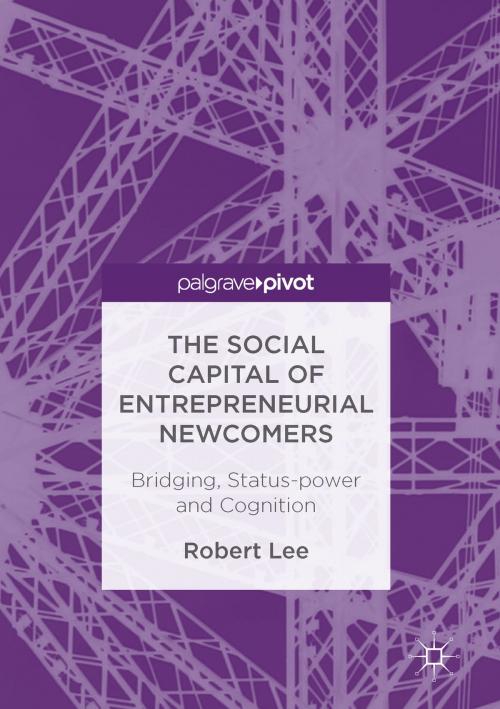The Social Capital of Entrepreneurial Newcomers
Bridging, Status-power and Cognition
Business & Finance, Career Planning & Job Hunting, Entrepreneurship, Entrepreneurship & Small Business| Author: | Robert Lee | ISBN: | 9781137598202 |
| Publisher: | Palgrave Macmillan UK | Publication: | March 30, 2017 |
| Imprint: | Palgrave Macmillan | Language: | English |
| Author: | Robert Lee |
| ISBN: | 9781137598202 |
| Publisher: | Palgrave Macmillan UK |
| Publication: | March 30, 2017 |
| Imprint: | Palgrave Macmillan |
| Language: | English |
'Lee takes the oft cited belief that entrepreneurial endeavour lives and dies by the quality of the networks set in play, and subjects it to a rigorous and sustained analysis. In this he not only provides the reader with an authoritative theoretical and empirical foray into how entrepreneurs can create and sustain different forms of social capital, he does so with a strong sense of how power frames and taints its acquisition and use. Lee¹s book is a valuable contribution to our understanding of how in entrepreneurial activity, as in many walks of life, it is those with already established status who set the agenda by which opportunity and its pursuit is constituted'.
Robin Holt, Professor of Entrepreneurship, Politics and Society, Copenhagen Business School, Denmark
Robert Lee drives forward the agenda of socially-situated cognition research, moving beyond a static model of entrepreneurial cognition and offering instead a dynamic, socially embedded, communication-based perspective. He breaks from the traditional focus on either the individual entrepreneurial agent or the social and institutional context of entrepreneurship and makes a serious and skilful effort to provide an integrative understanding of the entrepreneur as placed in a complex, relational and ambiguous context. Recognising that entrepreneurship is both cognitive and relational, he plays with the idea of power within legitimacy creation and through this illustrates the ultimately distributed nature of entrepreneurial processes. This book adds to the growing domain of socially-situated entrepreneurial cognition research and will appeal to those interested in understanding the connection between cognition, communication and legitimacy in the context of entrepreneurship.
Jean Clarke, Professor of Entrepreneurship and Organization, Leeds University Business School, University of Leeds, UK
‘In a very welcome contribution to the literature, Robert Lee explores the social capital mobilised by entrepreneurs and develops a communicative action approach that yields important insights into how would-be entrepreneurs achieve legitimacy through navigating the complex web of power and status relations in which they are enmeshed. This book will appeal not only to those interested in entrepreneurship, but also be a valuable reference source for those interested in the workings of social capital’.
Michael Bresnen, Professor of Organisation Studies, Alliance Manchester Business School, University of Manchester, UK
This book presents a novel and intellectually stimulating account of the understudied links between entrepreneurial newcomers’ bridging ties and their networked cognition. With a paucity of research addressing cognitively specific features of networked language and conduct, *The Social Capital of Entrepreneurial Newcomers *explores how entrepreneurial newcomers attune their cognition when interacting with high status and powerful vertical bridges. Largely reflecting communication accommodation perspectives, the author theoretically and empirically examines entrepreneurial newcomers’ cognitive ‘convergence’ and ‘divergence’ when bridging.
'Lee takes the oft cited belief that entrepreneurial endeavour lives and dies by the quality of the networks set in play, and subjects it to a rigorous and sustained analysis. In this he not only provides the reader with an authoritative theoretical and empirical foray into how entrepreneurs can create and sustain different forms of social capital, he does so with a strong sense of how power frames and taints its acquisition and use. Lee¹s book is a valuable contribution to our understanding of how in entrepreneurial activity, as in many walks of life, it is those with already established status who set the agenda by which opportunity and its pursuit is constituted'.
Robin Holt, Professor of Entrepreneurship, Politics and Society, Copenhagen Business School, Denmark
Robert Lee drives forward the agenda of socially-situated cognition research, moving beyond a static model of entrepreneurial cognition and offering instead a dynamic, socially embedded, communication-based perspective. He breaks from the traditional focus on either the individual entrepreneurial agent or the social and institutional context of entrepreneurship and makes a serious and skilful effort to provide an integrative understanding of the entrepreneur as placed in a complex, relational and ambiguous context. Recognising that entrepreneurship is both cognitive and relational, he plays with the idea of power within legitimacy creation and through this illustrates the ultimately distributed nature of entrepreneurial processes. This book adds to the growing domain of socially-situated entrepreneurial cognition research and will appeal to those interested in understanding the connection between cognition, communication and legitimacy in the context of entrepreneurship.
Jean Clarke, Professor of Entrepreneurship and Organization, Leeds University Business School, University of Leeds, UK
‘In a very welcome contribution to the literature, Robert Lee explores the social capital mobilised by entrepreneurs and develops a communicative action approach that yields important insights into how would-be entrepreneurs achieve legitimacy through navigating the complex web of power and status relations in which they are enmeshed. This book will appeal not only to those interested in entrepreneurship, but also be a valuable reference source for those interested in the workings of social capital’.
Michael Bresnen, Professor of Organisation Studies, Alliance Manchester Business School, University of Manchester, UK
This book presents a novel and intellectually stimulating account of the understudied links between entrepreneurial newcomers’ bridging ties and their networked cognition. With a paucity of research addressing cognitively specific features of networked language and conduct, *The Social Capital of Entrepreneurial Newcomers *explores how entrepreneurial newcomers attune their cognition when interacting with high status and powerful vertical bridges. Largely reflecting communication accommodation perspectives, the author theoretically and empirically examines entrepreneurial newcomers’ cognitive ‘convergence’ and ‘divergence’ when bridging.















